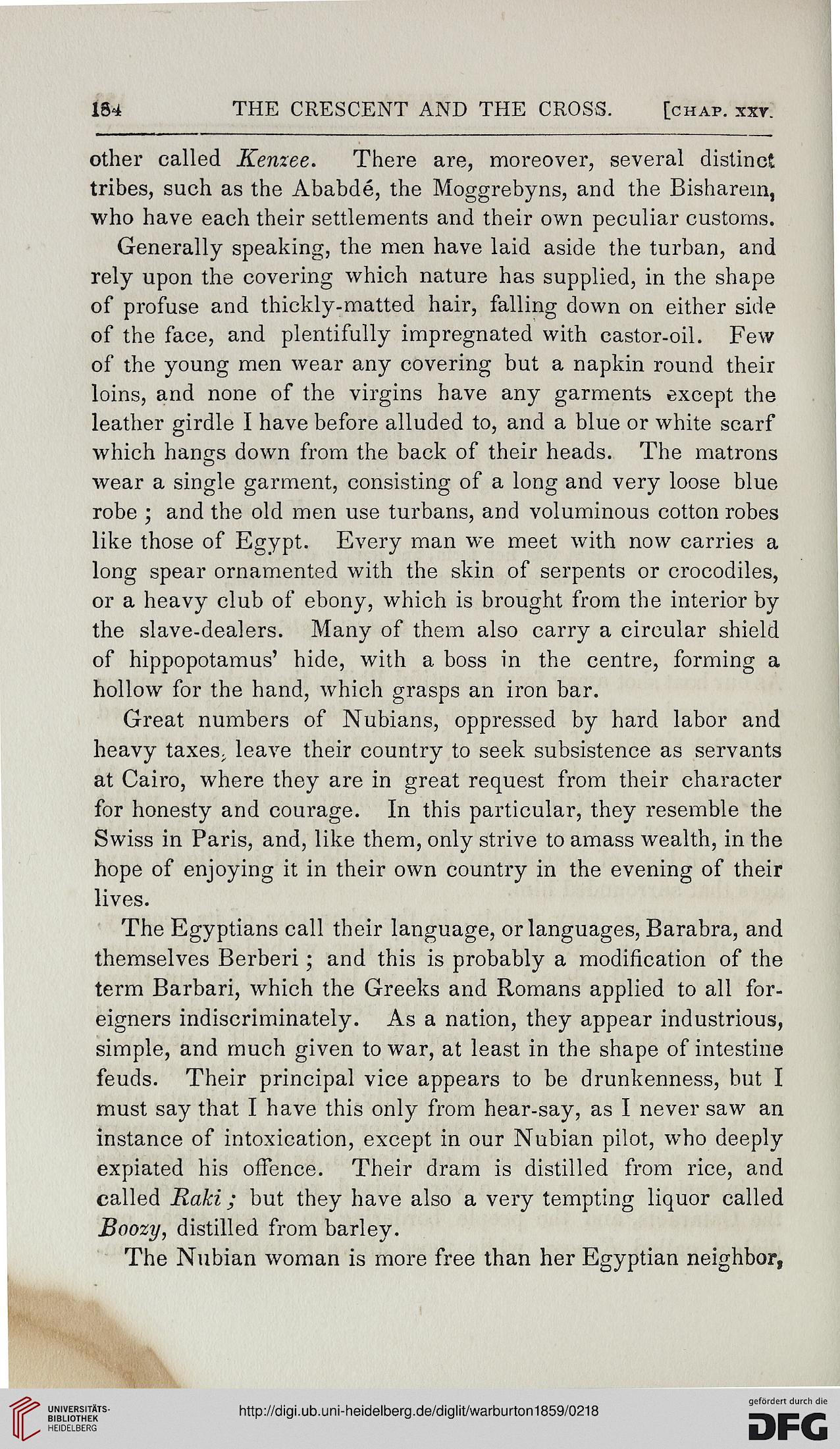184
THE CRESCENT AND THE CROSS.
[chap. xxv.
other called Kenzee. There are, moi-eover, several distinct
tribes, such as the Ababde, the Moggrebyns, and the Bisharem,
who have each their settlements and their own peculiar customs.
Generally speaking, the men have laid aside the turban, and
rely upon the covering which nature has supplied, in the shape
of profuse and thickly-matted hair, falling down on either side
of the face, and plentifully impregnated with castor-oil. Few
of the young men wear any covering but a napkin round their
loins, and none of the virgins have any garments except the
leather girdle I have before alluded to, and a blue or white scarf
which hangs down from the back of their heads. The matrons
wear a single garment, consisting of a long and very loose blue
robe ; and the old men use turbans, and voluminous cotton robes
like those of Egypt. Every man we meet with now carries a
long spear ornamented with the skin of serpents or crocodiles,
or a heavy club of ebony, which is brought from the interior by
the slave-dealers. Many of them also carry a circular shield
of hippopotamus' hide, with a boss in the centre, forming a
hollow for the hand, which grasps an iron bar.
Great numbers of Nubians, oppressed by hard labor and
heavy taxes, leave their country to seek subsistence as servants
at Cairo, where they are in great request from their character
for honesty and courage. In this particular, they resemble the
Swiss in Paris, and, like them, only strive to amass wealth, in the
hope of enjoying it in their own country in the evening of their
lives.
The Egyptians call their language, or languages, Barabra, and
themselves Berberi ; and this is probably a modification of the
term Barbari, which the Greeks and Romans applied to all for-
eigners indiscriminately. As a nation, they appear industrious,
simple, and much given to war, at least in the shape of intestine
feuds. Their principal vice appears to be drunkenness, but I
must say that I have this only from hear-say, as I never saw an
instance of intoxication, except in our Nubian pilot, who deeply
expiated his offence. Their dram is distilled from rice, and
called Raki; but they have also a very tempting liquor called
Boozy, distilled from barley.
The Nubian woman is more free than her Egyptian neighbor,
THE CRESCENT AND THE CROSS.
[chap. xxv.
other called Kenzee. There are, moi-eover, several distinct
tribes, such as the Ababde, the Moggrebyns, and the Bisharem,
who have each their settlements and their own peculiar customs.
Generally speaking, the men have laid aside the turban, and
rely upon the covering which nature has supplied, in the shape
of profuse and thickly-matted hair, falling down on either side
of the face, and plentifully impregnated with castor-oil. Few
of the young men wear any covering but a napkin round their
loins, and none of the virgins have any garments except the
leather girdle I have before alluded to, and a blue or white scarf
which hangs down from the back of their heads. The matrons
wear a single garment, consisting of a long and very loose blue
robe ; and the old men use turbans, and voluminous cotton robes
like those of Egypt. Every man we meet with now carries a
long spear ornamented with the skin of serpents or crocodiles,
or a heavy club of ebony, which is brought from the interior by
the slave-dealers. Many of them also carry a circular shield
of hippopotamus' hide, with a boss in the centre, forming a
hollow for the hand, which grasps an iron bar.
Great numbers of Nubians, oppressed by hard labor and
heavy taxes, leave their country to seek subsistence as servants
at Cairo, where they are in great request from their character
for honesty and courage. In this particular, they resemble the
Swiss in Paris, and, like them, only strive to amass wealth, in the
hope of enjoying it in their own country in the evening of their
lives.
The Egyptians call their language, or languages, Barabra, and
themselves Berberi ; and this is probably a modification of the
term Barbari, which the Greeks and Romans applied to all for-
eigners indiscriminately. As a nation, they appear industrious,
simple, and much given to war, at least in the shape of intestine
feuds. Their principal vice appears to be drunkenness, but I
must say that I have this only from hear-say, as I never saw an
instance of intoxication, except in our Nubian pilot, who deeply
expiated his offence. Their dram is distilled from rice, and
called Raki; but they have also a very tempting liquor called
Boozy, distilled from barley.
The Nubian woman is more free than her Egyptian neighbor,




